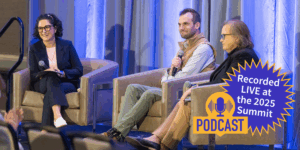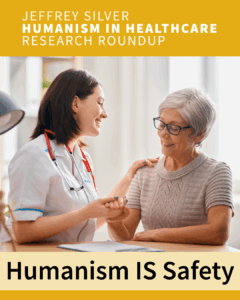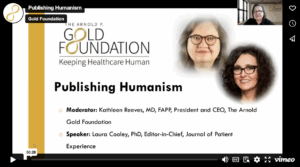 The Jeffrey Silver Humanism in Healthcare Research Roundup features summaries of recently published studies on humanism in healthcare. To receive email notification of new studies once per month, enter your information here and select “Jeffrey Silver Research Roundup” from the checkboxes at the bottom. See previous posts in this series.
The Jeffrey Silver Humanism in Healthcare Research Roundup features summaries of recently published studies on humanism in healthcare. To receive email notification of new studies once per month, enter your information here and select “Jeffrey Silver Research Roundup” from the checkboxes at the bottom. See previous posts in this series.
Publications from Gold Foundation-Affiliated Authors
Charter on Physician Well-being
Thomas LR, Ripp JA, West CP. JAMA. 2018 Mar 29.
This Charter was created in a collaboration between the Gold Foundation and the Collaborative for Healing and Renewal in Medicine as part of a Mapping the Landscape advocacy grant.
After years of rising rates of physician burnout and increasing alarm over the epidemic’s impact, guidelines on promoting the well-being of health professionals have, for the first time, been developed with consensus and endorsed or supported by over a dozen leading health organizations. The charter is a landmark document designed to guide groups and individuals, from global healthcare organizations to medical students, residents and physicians.
“It’s not just time off”: A framework for understanding factors promoting recovery from burnout among internal medicine residents
Abedini NC, Stack SW, Goodman JL, Steinberg KP. J Grad Med Educ. 2018 Feb;10(1):26-32.
Dr. Stack is a Mapping the Landscape grantee.
Researchers interviewed residents and recent graduates who experienced and recovered from burnout during residency. Analysis showed two different categories of resident burnout: circumstantial and existential. Circumstantial burnout stemmed from self-limited circumstances and environmental triggers. Recovery from, and subsequent avoidance of, circumstantial burnout arose from resolving workplace challenges; nurturing personal lives; and taking time off. Existential burnout stemmed from a loss of meaning in medicine and an uncertain professional role. Themes around recovery included recognizing burnout and feeling validated; connecting with patients and colleagues; finding meaning in medicine; and redefining a professional identity and role.
Provider perceptions of the organization’s cultural competence climate and their skills and behaviors targeting patient-centered care for socially at-risk populations
Purnell TS, Marshall JK, Olorundare I, Stewart RW, Sisson S, Gibbs B, Feldman LS, Bertram A, Green AR, Cooper LA. J Health Care Poor Underserved. 2018;29(1):481-496
Dr. Green is a Gold Professor.
Researchers surveyed 1,220 practicing physicians about their perceptions of their organization’s cultural competence climate and their skills and behaviors targeting patient-centered care for culturally and socially diverse patients. Less than half of providers reported engaging in behaviors to address cultural and social barriers more than 75% of the time. Providers who reported moderate or major structural problems were more likely to report low skillfulness in identifying patient mistrust, how well patients read and write English, and socioeconomic barriers than providers who reported only small or no structural problems.
Stress from uncertainty and resilience among depressed and burned out residents: A cross-sectional study
Simpkin AL, Khan A, West DC, Garcia BM, Sectish TC, Spector ND, Landrigan CP. Acad Pediatr. 2018 Mar 7. pii: S1876-2859(18)30122-0.
Dr. Simpkin is a Mapping the Landscape grantee.
Researchers surveyed 86 residents in pediatric residency programs to determine how stress from uncertainty is related to resilience and whether these attributes are associated with depression and burnout. They found that high levels of stress from uncertainty and low levels of resilience were strongly correlated with depression, and burnout. Efforts to enhance tolerance of uncertainty and resilience among residents may provide opportunities to mitigate resident depression and burnout.
First year medical student peer nominations of professionalism: A methodological detective story about making sense of non-sense
Mullikin TC, Shahi V, Grbic D, Pawlina W, Hafferty FW. Anat Sci Educ. 2018 Mar 22.
Dr. Hafferty is a Mapping the Landscape grantee.
Researchers assessed professionalism within a cohort of medical students seven times over 13 weeks. Each time, students were asked to identify a professionalism role model from among their peers and to score Likert-structured rationales for their decision. Researchers found that the greater the stability in one’s choice of a professionalism role model nomination over the data periods, the more stable one’s reasons for that nomination. They conclude that while peer assessment of professionalism by first-year medical students may not be very reliable, students can differentiate between more personal and professional factors, even at this early stage in their professional development.
Thriving in scrubs: A qualitative study of resident resilience (free full text)
Winkel AF, Honart AW, Robinson A, Jones AA, Squires A. Reprod Health. 2018 Mar 27;15(1):53.
All members of this research team are Mapping the Landscape grantees.
A qualitative study using grounded theory examined the lived experience of resilience in 18 obstetrics and gynecology residents. Researchers found that resilience in residents is rooted in personal and professional identity, and requires engagement with adversity to develop. Connections within the medical community, finding personal fulfillment in the work, and developing self-care practices enhance resilience.
Transformative learning and professional identity formation during international health electives: A qualitative study using grounded theory
Sawatsky AP, Nordhues HC, Merry SP, Bashir MU, Hafferty FW. Acad Med. 2018 Mar 27.
Dr. Hafferty is a Mapping the Landscape grantee.
Researchers collected narrative reports from 377 participants in international health electives (IHEs). Five components of transformative learning were identified: a disorienting experience; an emotional response; critical reflection; perspective change; and a commitment to future action. Three domains relating to professional identity were identified: making a difference; the doctor-patient relationship; and medicine in its “purest form.” Researchers concluded that IHEs provide rich experiences for transformative learning and professional identity formation.
Other Publications
Does self-compassion mitigate the relationship between burnout and barriers to compassion? A cross-sectional quantitative study of 799 nurses
Dev V, Fernando AT 3rd, Lim AG, Consedine NS. Int J Nurs Stud. 2018 Feb 21;81:81-88.
Researchers surveyed 799 New Zealand nurses using the Copenhagen Burnout Inventory, the Barriers to Physician Compassion scale, and a measure of dispositional self-compassion. They found that greater burnout predicted greater barriers to compassion while self-compassion predicted fewer barriers. They concluded that while self-compassion predicted lower burnout and barriers, it may not necessarily reduce the extent to which burnout contributes to the experience of barriers to compassion in medicine.
Mindfulness among genetic counselors is associated with increased empathy and work engagement and decreased burnout and compassion fatigue
Silver J, Caleshu C, Casson-Parkin S, Ormond K. J Genet Couns. 2018 Mar 4.
Researchers conducted a survey of 441 genetic counselors involved in direct patient care. Half of the respondents reported engaging in yoga, meditation, and/or breathing exercises. Mindfulness was positively correlated with work engagement and empathy. Mindfulness was negatively correlated with compassion fatigue and burnout. Researchers conclude that the integration of mindfulness into the genetic counseling field will likely improve professional morale and well-being, while promoting workforce retention and bolstering the relational and counseling aspects of clinical work.
Healthcare providers’ perspectives on perceived barriers and facilitators of compassion: Results from a grounded theory study
Singh P, Raffin-Bouchal S, McClement S, Hack TF, Stajduhar K, et al. J Clin Nurs. 2018 Mar 25.
Researchers conducted semi-structured focus groups with 57 frontline healthcare providers (HCPs) and individual interviews with peer-nominated exemplary compassionate care providers. Facilitators of compassion included personal facilitators, relational facilitators, systemic facilitators, and adaptive responses of intentional action. Challenges to compassion included personal challenges, relational challenges, systemic challenges, and maladaptive responses. Participants also identified HCPs themselves, including their responses towards the identified challenges of compassion, as significant factors.
Resident burnout: Evaluating the role of the learning environment (free full text)
van Vendeloo SN, Godderis L, Brand PLP, Verheyen KCPM, Rowell SA, Hoekstra H. BMC Med Educ. 2018 Mar 27;18(1):54.
Researchers conducted a cross-sectional online survey among 236 residents in a large university hospital in Belgium. They also assessed burnout and the learning environment. Forty-one percent of respondents met standard criteria for burnout. Analysis showed an inverse association between scores of the learning environment and the risk of burnout.



